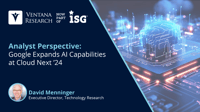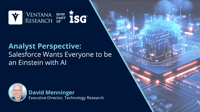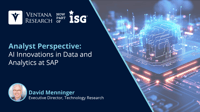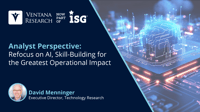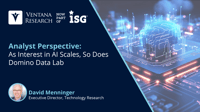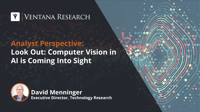About the Analyst

David Menninger
David is responsible for the overall research direction of data, information and analytics technologies at Ventana Research covering major areas including Analytics, Big Data, Business Intelligence and Information Management along with the additional specific research categories including Information Applications, IT Performance Management, Location Intelligence, Operational Intelligence and IoT, and Data Science. David is also responsible for examining the role of cloud computing, collaboration and mobile technologies as they affect these areas. David brings to Ventana Research over twenty-five years of experience, through which he has marketed and brought to market some of the leading edge technologies for helping organizations analyze data to support a range of action-taking and decision-making processes. Prior to joining Ventana Research, David was the Head of Business Development & Strategy at Pivotal a division of EMC, VP of Marketing and Product Management at Vertica Systems, VP of Marketing and Product Management at Oracle, Applix, InforSense and IRI Software. David earned his MS in Business from Bentley University and a BS in Economics from University of Pennsylvania.
In today's rapidly evolving technological landscape, artificial intelligence (AI) governance has emerged as a critical ingredient for successful AI deployments. It helps build trust in the results of AI models, it helps ensure compliance with regulations and it is necessary to meet internal governance requirements. Effective AI governance must encompass various dimensions, including data privacy, model drift, hallucinations, toxicity and perhaps most importantly, bias. Unfortunately, we expect...
Read More
Topics:
AI,
AI & Machine Learning,
Analytics & Data,
Generative AI,
Machine Learning Operations
As I’ve written recently, artificial intelligence governance is a concern for many enterprises. In our recent ISG Market Lens study on generative AI, 39% of participants cited data privacy and security among the biggest inhibitors to adopting AI. Nearly a third (32%) identified performance and quality (e.g., erroneous results), and an equal amount (32%) mentioned legal risk.
Read More
Topics:
AI,
AI & Machine Learning,
Analytics & Data,
Generative AI,
Machine Learning Operations
Having just completed our AI Platforms Buyers Guide assessment of 25 different software providers, I was surprised to see how few provided robust AI governance capabilities. As I’ve written previously, data governance has changed dramatically over the last decade, with nearly twice as many enterprises (71% v. 38%) implementing data governance policies during that time. With all this attention on data governance, I had expected AI platform software providers would recognize the needs of...
Read More
Topics:
AI,
AI & Machine Learning,
Analytics & Data,
Machine Learning Operations
I am happy to share insights gleaned from our latest Buyers Guide, an assessment of how well software providers’ offerings meet buyers’ requirements. The AI Platforms: Ventana Research Buyers Guide is the distillation of a year of market and product research by Ventana Research.
Read More
Topics:
AI,
Generative AI,
Machine Learning Operations
The artificial intelligence (AI) market is exploding with activity, which is part of the reason we recently announced that we have dedicated an entire practice at Ventana Research to the topic. Large language models (LLMs) and generative AI (GenAI) have taken the AI world by storm. In fact, we assert that through 2026, one-half of all AI investments will be based on generative rather than predictive AI. My colleague Rob Kugel has written about how AI can improve productivity and benefit the...
Read More
Topics:
AI,
natural language processing,
AI & Machine Learning,
Analytics & Data,
Generative AI
I recently attended the Salesforce Trailblazer DX event to learn more about Salesforce’s artificial intelligence products and strategy. Fueled by generative AI, awareness and investment in AI seems to be exploding. ISG research shows that enterprises plan to nearly triple the portion of budgets allocated to AI over the next two years. This doesn’t come as a big surprise when you look at the outcomes enterprises are achieving: Of those that have invested in AI, more than 8 in 10 (84%) have had...
Read More
Topics:
Artificial intelligence,
AI,
natural language processing,
Generative AI,
Deep Learning,
Model Building and Large Language Models,
Computer Vision,
Machine Learning Operations
Data and analytics have become increasingly important to all aspects of business. The modern data and analytics stack includes many components, which creates challenges for enterprises and software providers alike. As my colleague Matt Aslett points out, a better term might be modern data and analytics smorgasbord. There are arguments for and against using an assortment of tools versus a consolidated platform. For example, purchasing, integrating and deploying a variety of tools can be complex....
Read More
Topics:
Analytics,
AI,
data operations,
Analytics & Data,
Generative AI,
Data Intelligence
In the technology industry, 2023 will be remembered as the year of generative artificial intelligence. Yes, the world was made aware of GenAI when ChatGPT was publicly launched in November of 2022, but few knew the impact it would have at that point in time. Since then, GenAI has taken the world by storm, with vendors applying the technology to make it easier to ask questions about data, write code (including SQL), prepare data for analyses, document data pipelines and use software products...
Read More
Topics:
AI,
AI & Machine Learning,
Analytics & Data,
Generative AI,
Model Building and Large Language Models
Unstructured data has been a significant factor in data lakes and analytics for some time. Twelve years ago, nearly a third of enterprises were working with large amounts of unstructured data. As I’ve pointed out previously, unstructured data is really a misnomer. The data is structured; it's just not structured into rows and columns that fit neatly into a relational table like much of the other information enterprises process. Consequently, it requires different skills, different technology...
Read More
Topics:
Artificial intelligence,
AI & Machine Learning,
Analytics & Data,
Computer Vision






